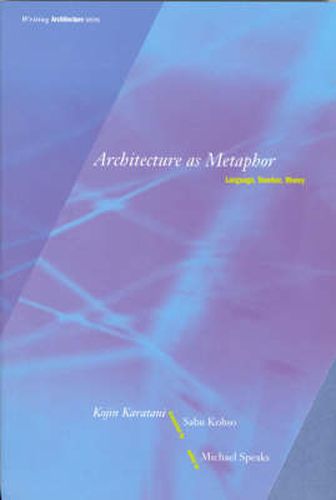Readings Newsletter
Become a Readings Member to make your shopping experience even easier.
Sign in or sign up for free!
You’re not far away from qualifying for FREE standard shipping within Australia
You’ve qualified for FREE standard shipping within Australia
The cart is loading…






One of Japan’s leading literary critics, Kojin Karatani is perhaps best known for his speculative philosophical works that, ranging from Kant to Nishida to Wittgenstein and Derida, are the generic equivalent to what in the West is called theory . Karatani’s writings are examples of a distinctly non-Western theoretical tradition. In Architecture as Metaphor , Karatani examines the relationship between archtecture and philosophy, literature, linguistics, city planning, anthropology, political economy, psychoanalysis and mathematics. Specifically, he tackles the recurrent will to architecture , which he argues is the foundation of all Western thinking. In the three parts of the book, he shows the necessity of construction, deconstruction and complex, secular construction/deconstruction. Because the will to architecture is practically nonexistent in Japan, Karatani must affirm the architectonic, which he does in the first section using a method based on formalist/structuralist linguistics, anthropology, and mathematics. He then explores the limits of formalism by reading the work of Jane Jacobs, Gilles Deleuze, Felix Guattari and Gregory Bateson against city planner Christopher Alexander’s model of trees and semi-lattices. Finally, Karatani pushes formalism to its limits by reexamining the deconstructive implications of Kurt Godel’s incompletness theorem.
$9.00 standard shipping within Australia
FREE standard shipping within Australia for orders over $100.00
Express & International shipping calculated at checkout
Stock availability can be subject to change without notice. We recommend calling the shop or contacting our online team to check availability of low stock items. Please see our Shopping Online page for more details.
One of Japan’s leading literary critics, Kojin Karatani is perhaps best known for his speculative philosophical works that, ranging from Kant to Nishida to Wittgenstein and Derida, are the generic equivalent to what in the West is called theory . Karatani’s writings are examples of a distinctly non-Western theoretical tradition. In Architecture as Metaphor , Karatani examines the relationship between archtecture and philosophy, literature, linguistics, city planning, anthropology, political economy, psychoanalysis and mathematics. Specifically, he tackles the recurrent will to architecture , which he argues is the foundation of all Western thinking. In the three parts of the book, he shows the necessity of construction, deconstruction and complex, secular construction/deconstruction. Because the will to architecture is practically nonexistent in Japan, Karatani must affirm the architectonic, which he does in the first section using a method based on formalist/structuralist linguistics, anthropology, and mathematics. He then explores the limits of formalism by reading the work of Jane Jacobs, Gilles Deleuze, Felix Guattari and Gregory Bateson against city planner Christopher Alexander’s model of trees and semi-lattices. Finally, Karatani pushes formalism to its limits by reexamining the deconstructive implications of Kurt Godel’s incompletness theorem.